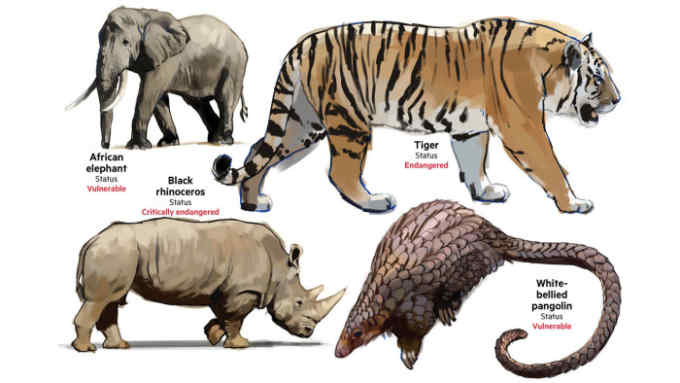Zoological Society of London: key facts about the FT’s charity partner
Roula Khalaf, Editor of the FT, selects her favourite stories in this weekly newsletter.

This year, the FT’s charity partner for its Seasonal Appeal is the Zoological Society of London. The charity was chosen by a group of senior FT editors.
What is ZSL?
The Zoological Society of London is an international charity dedicated to the conservation of animals and their habitats. Its mission is to “inspire, inform and empower people to stop wild animals going extinct”. ZSL runs London Zoo in Regent’s Park and Whipsnade Zoo in Bedfordshire.
What is ZSL’s history?
ZSL was founded in 1826 by Stamford Raffles, a former British East Indian administrator who also founded a British colony on the island of Singapore in 1819. Today, ZSL is supported by more than 500 volunteers and 100,000 members, fellows and patrons.
ZSL boasts a history of “firsts”, from the opening of the world’s first public aquarium in 1850 to the first successful breeding of cheetahs in Europe in 1967.
Today, the charity enables millions of people to get closer to wildlife through their zoos, and has a vast body of scientific discoveries and conservation successes to its name.
Where does ZSL work?
ZSL is active across the globe, with 259 staff and 434 community members trained in wildlife monitoring techniques across Africa and Asia. One of ZSL’s biggest initiatives, the EDGE of Existence programme, helps support 44 conservationists in 23 countries in their mission to protect the most evolutionarily distinct and globally endangered species.
For example, in 1995 ZSL helped reintroduce 100 sand gazelles back into the deserts of Saudi Arabia, at the time the world’s largest release of captive animals. In 2010, ZSL researchers in Sri Lanka “rediscovered” the Horton Plains slender loris, which had been presumed extinct since 2002.
The charity is engaged in conservation efforts in Thailand, where it is studying Indochinese tigers in the wild; across Africa, where it is establishing frameworks for cheetah conservation; and in the Canary Islands, to protect three endangered species of angel shark.
How much impact has ZSL had?
Since its inception, ZSL has worked to conserve some of the world’s most endangered species and improve the public’s understanding of environmental issues. To do that effectively, ZSL aims to foster sustainable relationships between people and wildlife, by educating communities on the effects of over-hunting and deforestation, for example, as well as connecting people to nature through local initiatives.
ZSL works with governments and other charities, including WWF, to reach areas on the frontline of the illegal wildlife trade — FT Magazine has reported on its work in Mongolia for a major feature launching the FT’s Seasonal Appeal. It has also helped conserve Asiatic lions in western India, reintroduced scimitar-horned oryx to Chad and northern bald ibis in Spain. In Kenya, ZSL helped recover the number of black rhinos, the population of which collapsed between 1970 and 1990 because of poaching.
The charity also works to counteract the pollution caused by humans. In the past year, 224 tonnes of fishing nets have been removed from the coastal regions of south-east Asia thanks to ZSL’s “Net-Works” project. In the UK, ZSL helped train 331 citizen scientists to monitor wildlife in the Thames.
How you can help
Please help us support ZSL’s urgent work by making a donation to the FT’s Seasonal Appeal. Click here to donate now.
If you are a UK resident and you donate before December 31, the amount you give will be matched by the UK government — up to £2m. This fund-matching will be used to help communities in Nepal and Kenya build sustainable livelihoods, escape poverty and protect their wildlife.
The above information about the UK government matching scheme was revised on November 21 to clarify that it only applies to UK residents

Comments